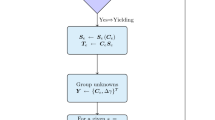Abstract
Using the Kröner–Lee elastic and plastic decomposition of the deformation gradient, a differential-algebraic system is obtained (in the so-called semi-explicit form). The system is composed by a smooth nonlinear differential equation and a non-smooth algebraic equation. The development of an efficient one-step constitutive integrator is the goal of this work. The integration procedure makes use of an explicit Runge–Kutta method for the differential equation and a smooth replacement of the algebraic equation. The resulting scalar equation is solved by the Newton–Raphson method to obtain the plastic multiplier. We make use of the elastic Mandel stress construction, which is power-consistent with the plastic strain rate. Iso-error maps are presented for a combination of Neo-Hookean material using the Hill yield criterion and a associative flow law. A variation of the pressurized plate is presented. The exact Jacobian for the constitutive system is presented and the steps for use within a structural finite element formulation are described .








Similar content being viewed by others
Notes
Order 11, 22, 33, 12, 13, 23, 21, 31, 32.
References
Areias, P., Matouš: Finite element formulation for modeling nonlinear viscoelastic elastomers. Comput. Methods Appl. Mech. Eng. 197, 4702–4717 (2008)
Areias, P., Dias-da-Costa, J., Alfaiate, Júlio E: Arbitrary bi-dimensional finite strain cohesive crack propagation. Comput. Mech. 45(1), 61–75 (2009)
Areias, P., Dias-da Costa, D., Pires, E.B., Infante Barbosa, J.: A new semi-implicit formulation for multiple-surface flow rules in multiplicative plasticity. Comput. Mech. 49, 545–564 (2012)
Betsch, P., Stein, E.: Numerical implementation of multiplicative elasto-plasticity into assumed strain elements with application to shells at large strains. Comput. Methods Appl. Mech. Eng. 179, 215–245 (1999)
Bonet, J., Wood, R.D.: Nonlinear Continuum Mechanics for Finite Element Analysis, 2nd edn. Cambridge University Press, Cambridge (2008)
Buchter, N., Ramm, E., Roehl, D.: Three-dimensional extension of nonlinear shell formulation based on the enhanced assumed strain concept. Int. J. Numer. Methods Eng. 37, 2551–3568 (1994)
Chen, C., Mangasarian, O.L.: Smoothing methods for convex inequalities and linear complementarity problems. Math. Program. 71(1), 51–69 (1995)
Chen, C., Mangasarian, O.L.: A class of smoothing functions for nonlinear and mixed complementarity problems. Comput. Optim. Appl. 5, 97–138 (1996)
Deuflhard, P., Hairer, E., Zugck, J.: One-step and extrapolation methods for differential-algebraic systems. Numer. Math. 51, 501–516 (1987)
Eidel, B., Gruttmann, F.: Elastoplastic orthotropy at finite strains: multiplicative formulation and numerical implementation. Comput. Mater. Sci. 28, 732–742 (2003)
Gurtin, M.E.: An Introduction to Continuum Mechanics, volume 158 of Mathematics in Science and Engineering. Academic Press, 111 Fifth Avenue, New York, New York 10003 (1981)
Hairer, E., Lubich, C., Roche, M.: The Numerical Solution of Differential-Algebraic Systems by Runge–Kutta Methods. Lecture notes in Mathematics, vol. 1409. Springer-Verlag, Berlin/Heidelberg (1989)
Hairer, E., Norsett, S.P., Wanner, G.: Solving Ordinary Differential Equations I. Nonstiff Problems. Springer Series in Computational Mathematics. Springer, Berlin Heidelberg, second revised edition (2008)
Hairer, E., Wanner, G.: Solving Ordinary Differential Equations II. Stiff and Differential-Algebraic Problems. Springer Series in Computational Mathematics. Springer, Berlin Heidelberg, second revised edition (2010)
Korelc, J.: Multi-language and multi-environment generation of nonlinear finite element codes. Eng. Comput. 18(4), 312–327 (2002)
Kröner, E.: Allgemeine kontinuumstheorie der versetzungen und eigenspannungen. Arch. Ration. Mech. Anal. 4, 273–334 (1960)
Lee, E.H.: Elasto-plastic deformation at finite strains. J. Appl. Mech. ASME 36, 1–6 (1969)
Lee, E.H., Liu, D.T.: Finite strain elastic-plastic theory particularly for plane wave analysis. J. Appl. Phys. 38(1), 19–27 (1967)
Lubliner, J.: Plasticity Theory. Macmillan, New York (1990)
Mandel, J.: Foundations of Continuum Thermodynamics, chapter Thermodynamics and Plasticity, pp. 283–304. MacMillan, London (1974)
Mandel, J.: Equations constitutives et directeurs dans les milieux plastiques et viscoplastiques. Int. J. Solids Struct. 9, 725–740 (1973)
Menzel, A.: Relations between material, intermediate and spatial generalized strain measures for anisotropic multiplicative plasticity. Acta Mech. 182, 231–252 (2006)
Moran, B., Ortiz, M., Shih, C.F.: Formulation of implicit finite element methods for multiplicative finite deformation plasticity. Int. J. Numer. Methods Eng. 29, 483–514 (1990)
Nemat-Nasser, S.: Plasticity: a Treatise on Finite Deformation of Heterogeneous Inelastic Materials. Cambrige University Press, Cambrige (2004)
Petzold, L.R.: Order results for implicit Runge–Kutta methods applied to differential/algebraic systems. SIAM J. Numer. Anal. 23(4), 837–852 (1986)
Scalet, G., Auricchio, F.: Computational methods for elastoplasticity: an overview of conventional and less-conventional approaches. Arch. Comput. Methods Eng. 25, 545–589 (2018)
Schröder, J., Gruttmann, F., Löblein, J.: A simple orthotropic finite elasto-plasticity based on generalized stress-strain measures. Comput. Mech. 30, 48–64 (2002)
Simo, J.C.: A framework for finite strain elastoplasticity based on the multiplica tive decomposition and hyperelastic relations. Part II: computational aspects. Comput. Methods Appl. Mech. Eng. 67, 1–31 (1988)
Simo, J.C.: Algorithms for static and dynamic multiplicative plasticity that preserve the classical return mapping schemes of the infinitesimal theory. Comput. Methods Appl. Mech. Eng. 99, 61–112 (1992)
Simo, J.C., Hughes, T.J.R.: Computational Inelasticity. Springer, corrected second printing edition (2000)
Simo, J.C., Ortiz, M.: A unified approach to finite deformation elastoplasticity based on the use of hyperelastic constitutive equations. Comput. Methods Appl. Mech. Eng. 49, 201–215 (1985)
Vladimirov, I., Pietryga, M.P., Reese, S.: Anisotropic finite elastoplasticity with nonlinear kinematic and isotropic hardening and application to sheet metal forming. Int. J. Plast. 26, 659–687 (2010)
Wolfram Research Inc. Mathematica (2007)
Wriggers, P.: Nonlinear Finite Element Methods. Springer, Berlin (2008)
Acknowledgements
The authors acknowledge the support of FCT, through IDMEC, under LAETA, Project UIDB/50022/2020.
Author information
Authors and Affiliations
Corresponding author
Additional information
Publisher's Note
Springer Nature remains neutral with regard to jurisdictional claims in published maps and institutional affiliations.
Rights and permissions
About this article
Cite this article
Areias, P. One-step semi-implicit integration of general finite-strain plasticity models. Int J Mech Mater Des 17, 73–87 (2021). https://doi.org/10.1007/s10999-020-09510-0
Received:
Accepted:
Published:
Issue Date:
DOI: https://doi.org/10.1007/s10999-020-09510-0



